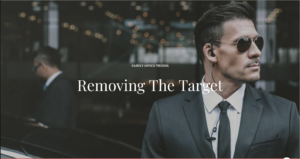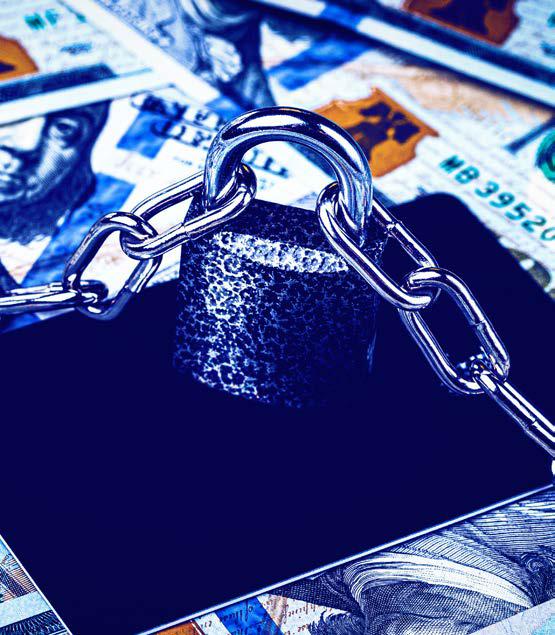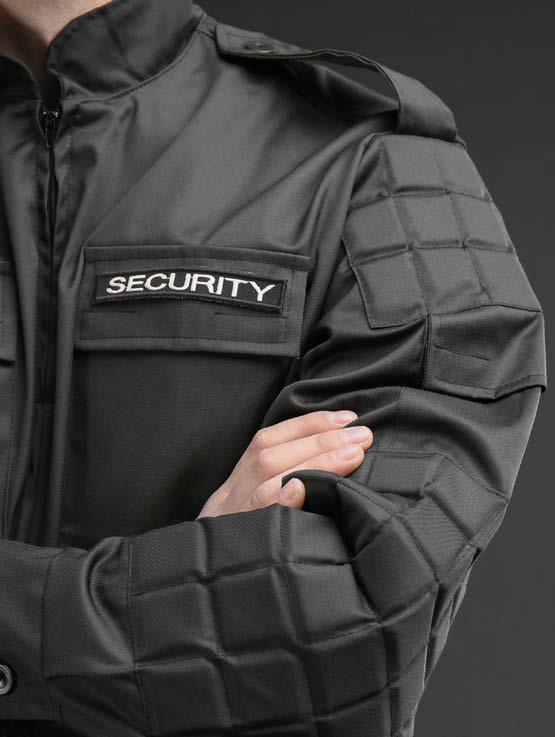Removing the Target

Removing the Target
You worked hard to earn your wealth, but your lifestyle might place a target on your personal safety. Recent Federal Bureau of Investigation (FBI) reports show predatory crime in America has decreased 50 percent since the 1990s, but cybercrime continues to grow, stealing over $835 million from Americans over 60 years old in 2019 alone. With great wealth comes great risk. But many family offices renounce the warning signs and continue to expose their personal safety to avoidable dangers.
Is this your truth? Do you feel safe in all situations? You probably shouldn’t according to Mark Baker, a 30-year veteran of law enforcement who provides crime risk assessments to wealthy families through RE1-Safe. As a tactical safety trainer, Mark says a large number of high-profile individuals expose themselves to predatory criminals every time they leave the house.
“I was in London a few years ago and met a very notorious British rock band member who inquired about the need to hire a security consultant. After discussing his family, touring and travel plans to identify risk exposures, the rocker agreed to take my advice to consider added security and the need to ‘have a security plan.’ After we finished at the musical venue, he grabbed his guitar and he and his family started walking toward the exit to hail a taxi. I asked him, ‘Where are you headed?’ He responded, ‘To a taxi stand a few blocks down and through Hyde Park.’ ‘Alone?’ I asked. ‘Yes. I know the way!,’ he replied.”
Baker reminded the man that he was transporting a very expensive vintage instrument and that his face would not go unrecognized on the streets of London. Aside from paparazzi, the rocker was about to create a potential fanatic mob situation. “I couldn’t believe he was so naïve after nearly 50 years of fame!”
While most wealthy individuals don’t have to endure paparazzi on a daily basis, some might underestimate their vulnerability to real-life and cyber criminals. Ask yourself: Is my business or digital identity at risk of ransomeware? Am I traveling to a country with a high-crime rate? Do I trust my inner circle to guard my privacy? Fortunately, there are solutions to improve your personal safety both online and IRL.
Smart Technologies Might Not Be Safe
 According to Amazon, there are 100 million Alexa-enabled devices currently in operation around the globe. Yet hackers continue to access these and video-enabled door cameras daily. Being plugged into the internet 24/7 comes with great risks. Ask a few unlucky celebrities about their viral sex tapes.
According to Amazon, there are 100 million Alexa-enabled devices currently in operation around the globe. Yet hackers continue to access these and video-enabled door cameras daily. Being plugged into the internet 24/7 comes with great risks. Ask a few unlucky celebrities about their viral sex tapes.
While the convenience of smart technology promises to improve our lives, the safety risks are cause for concern. “Social media platforms contain an abundance of information that could be used to gather intelligence on individuals,” says Baker. “What you’re doing, where you’re going, who you are with, and where you are located at any given moment. Vacation photos and location postings can jeopardize your personal safety, your home security, and make you, your family, or your valuables an easy target.”
 If you have wealth and enjoy technology, you might want to hire a digital security specialist who can assess your smart-technology risks. This includes your safety in high-performance vehicles that have internet-enabled systems (e.g., Audi or Tesla) or have bluetooth integration. Security professionals recommend you always walk to your vehicle with the key fob in your hand as it has a panic alarm button to scare away intruders or call attention to your endangerment. However, a hacker in San Francisco recently invented the “keyless repeater” which helps users break into any luxury car that uses a wireless key fob system. It sells for $9,000. Fortunately, many automotive insurers have coverage plans that will cover the expenses related to attacks and fraud.
If you have wealth and enjoy technology, you might want to hire a digital security specialist who can assess your smart-technology risks. This includes your safety in high-performance vehicles that have internet-enabled systems (e.g., Audi or Tesla) or have bluetooth integration. Security professionals recommend you always walk to your vehicle with the key fob in your hand as it has a panic alarm button to scare away intruders or call attention to your endangerment. However, a hacker in San Francisco recently invented the “keyless repeater” which helps users break into any luxury car that uses a wireless key fob system. It sells for $9,000. Fortunately, many automotive insurers have coverage plans that will cover the expenses related to attacks and fraud.
Viruses and malware attacks are on the rise. Beyond antivirus software, Fort Knox encryption and passwords, or hefty firewalls, you can protect yourself digitally by never using openconnected internet in hotels, airports, and public places (cafes, etc.). High-profile individuals are often also targets of “cuckoo’s eggs” attacks, in which hackers gain access to their computer and upload illegal items like child pornography or fraudulent tax documents. Have an information technology risk specialist assess your safety on all personal devices, including cellphones, laptops, and tablets.
Do I Need a Bodyguard?
You are at risk of personal safety and could benefit from protection if you are a:
- CEO of a large company on the verge of announcing big news that affects shareholders or employees, e.g., mergers, quarterly earnings, acquisitions, bankruptcy/restructuring, layoffs.
- High-net worth individual about to end a romantic relationship.
- Celebrity currently in the news or traveling to unfamiliar areas or abroad.
- High-profile politician or candidate.
- Big lottery winner or recent heir to a massive fortune.
Privacy vs. Personal Safety
Privacy is precious. But when you have great wealth, your need to remain private can be disabling. This is especially true if you continue to think your public rituals and unassuming behaviors should be no different than most people. Even if you drive a Honda, wear t-shirts and jeans, and never miss a Sunday dinner at home with the family, if you have great wealth, you need to watch your back.
“I tell my wealthy clients to incorporate some spontaneity in their everyday schedules,” says Baker. “Leave for work an hour later one day, drive a different route home, be unpredictable in your daily habits. This prevents someone who might be tracking your activity from planning a crime.”
Unfortunately, most criminals are not strangers. They work in your home, live in your home, or have high-level or special access to your private data or property. These include professionals you trust or have put your family’s safety in their hands. Chip Olson, CEO of RE1Advisor, the agency that provides the RE1Safe program, says background checks are a good first step when hiring help. “Our company will often go one step further and do risk assessments on long-time employees. If an employee is in serious financial distress this increases their chance of theft or embezzlement.”
Olson said his company has also been asked to help in cases where family offices must hire at-home healthcare for aging loved ones. “This is definitely not an area where you want a stranger that hasn’t been properly investigated. It’s also good practice for wealthy individuals to have all care professionals and home staff sign non-disclosure agreements.”
Christopher Lombardo, a Florida divorce attorney for high-net worth individuals, said his decision to have his 30 employees participate in an active shooter training class has changed the way he does business now. “When you receive death threats in writing you know these individuals don’t care anymore about logic or the law,” said Lombardo. “The class helped us identify our weaknesses and taught us how to be reflexive.”
Instead of an open reception area, Lombardo’s office now has added security features including cameras, more exit doors, and a restructured reception area that keeps employees safe. They’ve also purchased police-grade mace and trained key personnel on how to use it and developed an emergency plan that illustrates where to run or hide if a threatening individual enters the building.
Unfortunately, a too common occurrence these days is the purchase of a firearm without proper weapons training. Baker, who also leads active shooter training classes across the country, says in most cases he discourages clients from carrying a firearm in public, unless you have been properly trained and are familiar with the laws and issues concerning concealed carry. “If you are in an altercation, you are bringing a firearm into play, that very well may be used against you. A gun could prompt an aggressive response from someone who wasn’t planning on being aggressive, or from a bystander that witnesses what he or she may perceive as an active shooter threat and respond with deadly consequences.”
Instead, Baker suggests you “pay attention to those around you and their mannerism or behaviors. Travel with a companion and walk confidently, with purpose. Be cautious of people hanging around with no visible purpose. If you carry a purse, clutch it between your arm and body. Avoid wearing headphones, earbuds or constantly looking down at your phone. If you are distracted, then you are an easy target and a terrible witness when trying to describe what happened after a crime.”


Staying Safe Beyond Borders
With passports in hand, thousands of high-net worth Americans travel abroad each month in search of exotic respite, adventure, or economic opportunities. Typically not naïve to international travel, these globetrotters are often also experienced in navigating foreign customs, international business laws, and currency exchange hurdles. But there’s been growing concern over the personal safety risks facing these travelers. Here are some tips to keep you safe when traveling abroad:
- Check the U.S. Department of State’s Travel Advisories website to review international travel advisories/warnings (travel.state.gov).
- Enroll in the Start Traveler Enrollment Program which alerts U.S. Embassies and Consulates of your travel plans.
- For high-profile individuals, consider ransom and kidnapping insurance.
- Don’t put your name or phone number on luggage tags.
- Report any suspected virtual or real scams to the FBI.
- Have a plan to “check-in” with a friend or relative living in your home country on certain dates and/or times while traveling.
One of the most prevalent scams affecting international travelers today is virtual kidnapping. This crime involves a person stealing your personal information (and oftentimes cellphone) and contacting loved ones while they know you are not available. In some cases, they will lie and tell family that you’ve been kidnapped and demand money in exchange for safe return. In other cases, they call or stop you directly and warn you that you’ve been issued a “fine” that must be paid immediately or you will go to jail. The FBI recommends you get to a safe place and contact the FBI or U.S. Embassy. Wealthy individuals should also discuss these scenarios with family and advise them to call the FBI if they receive a suspicious phone call. Baker says being vigilant about personal security does not mean you are paranoid. “Many wealthy people think they can hide their wealth by just behaving like regular citizens. But criminals don’t normally target regular citizens; they are searching for people of means and the internet is making the task much easier.” From public records to vacation pictures, there will always be a thread of data on you that paints a picture for a criminal. So why don’t high-net worth individuals employ a security specialist or develop a personal security plan for themselves or family? Baker says it’s because of several factors:
- Perceived cost is the main reason as people believe a service this intimate must be expensive.
- Having additional visible security personnel may be perceived as “privileged” or “above” their friends.
- Fear it may create a constant reminder that, at any time, danger may be present, thus raising their level of anxiety and resistance to a visible security team.
- It will hamper their lifestyle and flexibility or the notion that they have never needed it before thus creating a false sense of security.
Ultimately, the question is: What do I need to do to feel safe or have a plan to protect the ones I love? Baker believes hiring a security agency to perform a full risk assessment is as important as getting a wellness checkup with your doctor is each year. A security contractor can help you identify areas of weakness in your home or business and recommend steps for added protection. Most agencies provide personal security assessment reports for a fee, and then you decide whether to proceed with or decline the recommendations. Just remember: Having a personal safety plan is simply another step in protecting your health – and life! It’s better to have the vaccination than the virus.